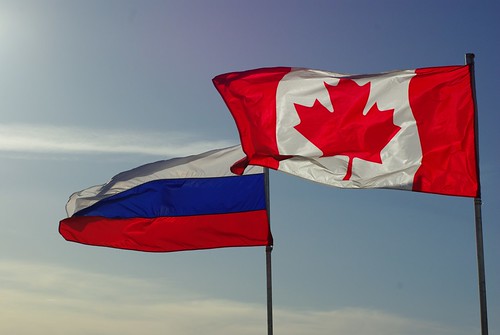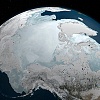Russia and Canada in the Arctic: rivals or allies?
In
Log in if you are already registered
Russia and Canada are the two largest Arctic countries. Three-quarters of the Arctic Ocean’s coastlines belong to Russia and Canada. Russia, with an Arctic coastline stretching over 20,000 km2[i], is the biggest Arctic state. The population of the Russian Arctic consists of approximately two million people, including twenty-seven ethnic minorities, totaling about 200,000 people[ii]. Canada is the second largest Arctic state. Canada’s Arctic coastline comprises nearly 75% of the country’s total shoreline, and the Canadian North accounts for 40% of the country’s landmass, but only about 100,000 Canadians live there, 80% of whom are indigenous peoples[iii]. The Arctic has also been embedded in both Russian and Canadian history approximately since the 16th century. In 1525, the Russian diplomat Dmitry Gerasimov established the first map of the Arctic Ocean basin[iv], and in 1670, Canada made its first claim to the North[v]. Due to their northern position and long-established human presence in the Arctic, both Russia and Canada emphasize their northern identities, and consequently regard the region as their strategic priority area.
The Arctic represents huge potential for the future of both Russia and Canada. The two countries not only have similar interests in the region – notably vast deposits of natural resources and shipping routes – but also common challenges to cope with – Arctic environmental protection and the question of indigenous peoples’ status. Considering their national interest in the Arctic, the priority objective of both Russia and Canada is to assert their sovereignty in order to protect and promote their national interest. Russia and Canada, in a certain sense, mirror each other in the Arctic since they display similar geographical, historical and identity characteristics, but their overlapping interests could lead either to competition or to cooperation. With this background in mind, the present article explores the current state of Russian-Canadian relations in the Arctic in order to analyze the potential for future cooperation between the two states.
Photo: Flickr / Kimli
Cool-off in Russian-Canadian relations in the Arctic: main prospects for cooperation
The first legally binding agreement on Russian-Canadian cooperation in the Arctic and the North was signed in 1989 between Canada and the then USSR[vi], and a similar agreement was signed in 1992 with the Russian Federation – the Political Agreement on Consent and Cooperation. In 1993, Russia and Canada jointly established the Intergovernmental Economic Commission in order to promote economic cooperation between Russia and Canada on the basis of working groups and round tables discussing agriculture, energy, construction, mining, and the Arctic and the North[vii]. In December 2000, Russia and Canada signed the Joint Russian-Canadian Statement on Cooperation in the Arctic and the North, which outlines the main directions of Russia-Canada bilateral cooperation in the Arctic for the 21st century. In 2001, Russia and Canada also organized in Canada a joint Russian-Canadian North-to-North congress in order to discuss the challenges and opportunities of Arctic development[viii], and signed in 2007 a series of sectorial agreements concerning energy resources, agriculture, fisheries and veterinary checks as well as in the financial field[ix].
Both Russia and Canada acknowledged that cooperation remains a priority in their Arctic relations, especially as concerns the region’s socio-economic development. In this respect, natural resources, trade, transportation, environmental protection, indigenous peoples, scientific and technological cooperation, and security are Russia-Canada cooperation’s priorities. Another scope of Russia-Canada cooperation in the Arctic involves the status of the Northern Sea Route (Russia) and the Northwest Passage (Canada). While the US and the European Union want to see these routes as international shipping routes, Russia and Canada affirm their respective sovereignty over the NSR and NWP, and have announced that transport along the NSR and the NWP falls respectively under Russian and Canadian jurisdiction. Respect of international law and enhancement of Arctic multilateralism are also other important platforms for cooperation between Russia and Canada in the Arctic. Both countries have confirmed their commitment to conflict resolution principles of international law, and aim to transform the Arctic Council into the leading regional and international organization on Arctic issues with the right to make decisions[x]. However, unresolved territorial boundary disputes and the ongoing Ukrainian conflict, which started in April 2014, significantly hinder cooperation between Russia and Canada in the Arctic.
Icy Russian-Canadian relations in the Arctic
The first cause of disagreement between Russia and Canada is their conflicting claims on the continental shelf over the Lomonosov Ridge. In accordance with UNCLOS Article 76, which stipulates that a state can extend its continental shelf up to 350 nautical miles from the baselines from which the breadth of the territorial sea is measured if it proves that it is a natural prolongation of its land territory[xi], Russia made its first claim over the continental shelf in the Arctic Ocean on 20 December 2011. In its claim, Russia argues that both the Lomonosov Ridge and the Alpha-Mendeleev Ridge are geopolitical extensions of its continental Siberian shelf. However, in June 2012, the Commission on the Limits of the Continental Shelf (CLCS) found the grounds of Russia’s claim insufficient and asked for more information. Russia will submit its second submission to the CLCS by spring 2015[xii]. Canada also wants to prove that the Lomonosov Ridge is an extension of the North American continental platform. Canadian authorities have also asked scientists to work on a future submission to demonstrate that the North Pole is also part of the outer limits of Canada’s continental shelf[xiii]. Yet, it is worth mentioning that Canada has not submitted its claim yet to the CLCS. Consequently, the dispute of sovereignty between Russia and Canada in the Arctic Ocean is for now only media hype.
A second point of potential tension in Russia-Canada relations in the Arctic is closely linked to Canada’s mistrust of Russia since the conflict in Ukraine started. Canada has been one of Russia’s most active critics, and suspended all its bilateral military exercises with Russia in the region, as well as their common work within the Canadian-Russian Intergovernmental Economic Commission[xiv]. Canada has also boycotted the Arctic Council conference that took place in Moscow on 14-15 April 2014. Closely entangled with Ukraine, Canada has adopted a negative perception of Russia’s military build-up in the region. Canadian Prime Minister Stephen Harper views the modernization of Russian military capacities as a direct threat to Canada’s sovereignty and to other Arctic nations[xv], and in this respect has been developing a harsh anti-Russian rhetoric: “In Europe, we see the imperial ambitions of Vladimir Putin, who seems determined that, for Russia’s neighbors, there shall be no peace, and because Russia is also Canada’s neighbor, we must not be complacent here at home”[xvi]. Consequently, Canada reiterated its plans to assert its sovereignty in the Arctic, and to that end likewise Canada will strengthen its military forces and presence[xvii]. In 2013, Canada opened a new Canadian Forces Arctic Training Center in Resolute Bay[xviii], and regularly carries out military exercises in the Arctic, in particular in the framework of Canadian Forces Operation Nanook involving personnel from all branches of the Canadian forces (air, land and sea). Nevertheless, even though Canada is a long-time US ally and a NATO member, Canadian officials are not in favor of NATO’s further involvement in the Arctic[xix], which is perceived not only as diminishing Canadian sovereign claims over its natural resources and shipping lanes, but also as encouraging Russia to boost its military buildup even more.
Conclusion
I would like to emphasize three points concerning Russian-Canadian relations in the Arctic. Firstly, Russia and Canada are similar Arctic nations in terms of size, identity, and interests. Their respective strategies both aim to assert their sovereignty in the Arctic to ensure the respect of their rights and interests in the region. In this respect, both countries favor the use of armament as a guarantee of sovereignty and a symbolic presence of force and power. On the other hand, both Russia and Canada are inclined to cooperate with their Arctic neighbors, not only to promote their interests, but also to ensure the peaceful and sustainable development of the region. Secondly, the paper has highlighted that the prospects of cooperation between Russia and Canada in the Arctic are numerous and appear in every sphere related to Arctic development. If one only focuses on economic aspects, including natural resources and shipping routes, Russia and Canada indeed could be competing powers. Yet, considering Arctic complex environment and drastic climatic condition, Russia and Canada are likely to need each other’s expertise in order to optimize the development of their respective Arctic zones. In this respect, the two countries signed in 2011 the Joint Russian-Canadian Statement on Cooperation in Science, Technology and Innovation. Furthermore, Russia and Canada can also find another ground for cooperation in order to prevent further NATO presence in the Arctic, and to protect their interests from the increasing involvement of non-Arctic actors such as the EU and some Asian states. Last but not least, despite the deterioration in Russian-Canadian relations on Arctic cooperation due to the conflict in Ukraine, and Stephen Harper’s anti-Russian rhetoric, Russian-Canadian quarrel is only a political battleground, which is not only encouraged by the upcoming political elections in Canada, but also exaggerated in the media, where the Arctic is often presented as being on the edge of a military conflict. However, none of the Arctic states has plans to turn the region into a battlefield for territorial expansion and natural resources, but, on the contrary, they have decided to resolve their disputes through negotiations and in accordance with international law[xx].
[i] СВЕЧНИКОВ А.Л., «Экологические проблемы Арктического региона» // Арктической регион – Проблемы международного сотрудничества, Том 2, Москва, Российский Совет по Международным Делам (РСМД), 2013, С. 259.
[vi] http://www.international.gc.ca/arctic-arctique/partners-international-partenaires.aspx?lang=eng
[xv] http://www.cbc.ca/news/politics/stephen-harper-raises-spectre-of-russian-threat-in-arctic-speech-to-troops-1.2747703
[xvi]http://www.cbc.ca/news/politics/stephen-harper-raises-spectre-of-russian-threat-in-arctic-speech-to-troops-1.2747703.
[xvii] http://www.international.gc.ca/arctic-arctique/arctic_policy-canada-politique_arctique.aspx?lang=eng
[xviii] http://www.nunatsiaqonline.ca/stories/article/65674ottawa_opens_scaled-back_arctic_training_facility_in_resolute_bay





